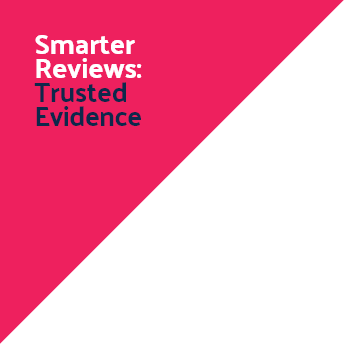Case Study
University of Guelph Cuts Screening Time by Almost 50% with DistillerSR’s AI
Ontario Veterinary College at the University of Guelph reduces their screening burden in one project by 7,000 references
The Ontario Veterinary College at the University of Guelph is a pioneer in using systematic reviews to report on animal health and livestock research questions.

Significant Time Savings with AI
DistillerSR’s artificial intelligence-powered reference reprioritization capability increased the efficiency of the organization’s screening process. Researchers cut screening times in half with DistillerSR’s AI, ensuring they can move onto subsequent parts of their reviews sooner.

Efficient Transfer of Knowledge

Supports a Non-Linear Workflow
Unlike spreadsheets, DistillerSR supports a non-linear workflow, meaning that various parts of the review can be worked on at the same time, making the process more efficient and less time-consuming.
One of the First Veterinary Colleges to Report on Animal Outcomes
For the Ontario Veterinary College at the University of Guelph, conducting systematic reviews to report on animal research questions was not always a common activity. According to Jan Sargeant, Professor, Department of Population Medicine, Ontario Veterinary College, University of Guelph, it was only about 15 years ago that the organization began conducting systematic reviews for this type of research.
Today, the college conducts between 8-10 scoping or systematic reviews per year with up to 15,000 references requiring eligibility screening per review in addition to several systematic reviews that contain, on average, up to 6,000 references to screen. This large workload of reviews is mainly conducted by graduate students.
Configurability Promotes Data Integrity
For Sargeant and her organization, one of the biggest drivers for switching from a spreadsheet systematic review approach to a configurable software platform was the ability to preserve and re-use data. “Since we rely on grad students, organization and data security are big factors for us,” she said. “DistillerSR enables us to configure the software in a way that enables efficient data transfers and permanent archives of the original data. That way, if the original person who worked on the project is not available, someone else can pick it up very easily.”
Remote Collaboration and Non-Linear Process Saves Time
“We also work with numerous groups in different geographic locations,” said Sargeant. “We chose DistillerSR because groups can collaborate remotely and the learning curve for someone to pick up the software is not terribly steep and can be easily learned.” This means that Sargeant’s team can collaborate in real-time, even in instances where the team might be in different time zones, without needing to wait for someone else to update their work. Everything in DistillerSR is updated and tracked automatically.
Sargeant also credits DistillerSR with having the ability to move to other aspects of the review sooner, resulting in a non-linear, more efficient workflow. For example, with a spreadsheet, reviewers would need to complete all screening before moving onto the subsequent data extraction level of the review. However, with DistillerSR, reviewers can work in tandem on multiple tasks.
“If you’re using a spreadsheet, you can only do one thing at a time,” she said. “A person cannot screen effectively for 8 hours straight, it’s just not possible. With DistillerSR, reviewers can multi-task and work on different aspects of the project so they don’t get tired doing the same thing all the time.” DistillerSR’s project management and user metric tools also help Sargeant monitor reviewers to make sure the project is always progressing as it should.
“We used DistillerSR’s AI in a recent review and it helped cut the workload by about half. We were able to confidently stop screening with only half of the references screened.”
Artificial Intelligence Saves Even More Time
“In one of our recent reviews, we used the AI to rank our references by likelihood of relevance. After we screened about 500 consecutive references without a relevant inclusion, we stopped. It saved us from screening about 7,000 references in an approximate 18,500-reference screening list,” Sergeant said.
“We also currently use the AI classifiers for post-analysis to see what would have happened with or without using AI,” she said. “We were impressed; the AI predicted we would find 814 references to include, and in reality we found 813. It’s quite accurate.”
Moving Forward with More Living Reviews
Using DistillerSR, the college can efficiently update their reviews, taking on updates every couple months rather than years. The streamlined process and ability to re-use data means that Sargeant’s review process is becoming more focused on living reviews, rather than static ones that require significant resources.
“DistillerSR really is an ‘all-in-one’ solution that has saved my organization a lot of heartache,” said Sargeant.
Download the PDF version of this case study
Learn More About DistillerSR




